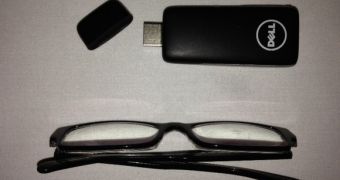The Raspberry Pi credit card-sized ARM computer made sure that most everyone was aware that super-small computers were definitely possible and useful, which is why Dell's latest project might not cause as much shock as it otherwise would have.
And by Dell's latest project we mean just that: the Project Ophelia Universal Serial Bus device that most definitely isn't a flash drive, despite looking like one.
Of course, a case may be made for Project Ophelia looking like a wireless communications receiver, but those, too, look like USB flash drives.
Digressions aside, the Dell's Ophelia is a full-featured personal computer that can plug into any HDTV and turn it into a Smart TV.
This is much the same thing we said years ago, when the Raspberry Pi first came out.
But the difference between the two gadgets is clear: the Pi was made for teaching computer programming, and ended up getting attention for also having multimedia potential, while Project Ophelia is specifically aimed at entertainment.
Ophelia runs the Google Android operating system, but we aren't sure exactly which version.
Since the first developer samples will ship in July this year (PC World report), we'll probably have to wait until then for this mystery to be elucidated.
Us mortals will only get to buy the things from August onwards, through telecom providers and cable companies. The Ophelia will be paired with cable and data plans.
Only afterwards will Dell start taking orders for the USB PC itself, standalone, although it might bundle it with IT administration tools, for enterprises that want it instead of thin client PCs.
Finally, Wyse's PocketCloud is installed (permits users to access content stores on servers, PCs and other mobile devices).
The price of Ophelia will be $100 / 78 – 100 EUR. Android games and Apps will work on it, as will video services like Netflix and Hulu.

 14 DAY TRIAL //
14 DAY TRIAL //